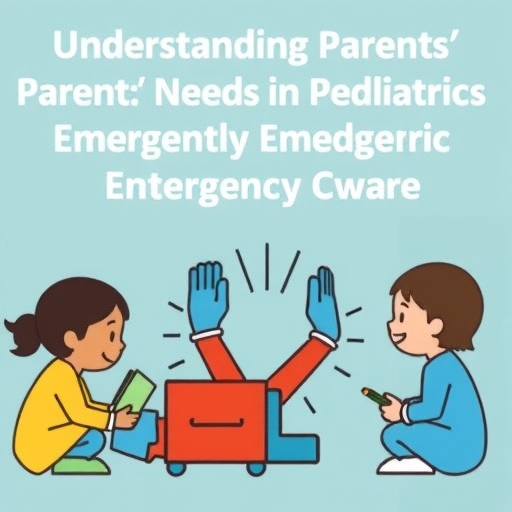In a groundbreaking study published in the BMC Health Services Research, researchers Butun and Yeşil explore a critical yet often overlooked aspect of pediatric healthcare: the experiences and needs of parents admitted to pediatric emergency departments. This research sheds light on the concerns and anxieties that parents face during one of the most stressful times in their children’s lives—their medical emergencies. The study emphasizes the necessity for healthcare providers to address not just the medical needs of children but also the emotional and informational requirements of parents.
The pediatric emergency department can be a daunting environment. Parents often enter these spaces in a crisis, often feeling powerless and anxious about their child’s medical condition. Their needs can encompass a vast array of concerns, including needing clarity about their child’s diagnosis, understanding treatment options, and simply needing emotional support. These factors play a significant role in how well parents can interact with healthcare professionals and manage stress during medical emergencies.
The study employed a mixed-methods approach, utilizing both quantitative surveys and qualitative interviews to ensure a comprehensive understanding of parental needs. By collecting data from a broad demographic of parents, the researchers aimed to identify common challenges faced in the emergency setting. These insights will provide a framework for improved communication between medical staff and families, thereby enhancing the overall patient care experience.
Data analysis unveiled key themes in parents’ experiences. Many reported feeling overwhelmed by the suddenness of the emergency, which sometimes left them feeling unprepared and uninformed. They expressed a strong desire for transparent communication from healthcare providers regarding their child’s health status and treatment plan. Such insights highlight the critical need for medical personnel to offer more than just clinical care—there’s a pressing demand for empathy, understanding, and effective communication in these high-stress environments.
Furthermore, the research found that emotional support systems play a pivotal role in the experiences of parents within pediatric emergency departments. Parents dealing with their child’s health concerns frequently seek validation of their feelings and reassurance from healthcare professionals. The importance of fostering a compassionate environment can not be overstated; such emotional support can significantly help alleviate parental distress, thereby contributing to better outcomes for the pediatric patient.
As healthcare systems continue to evolve towards a more patient-centered approach, studies like this one challenge the norm and push the boundaries for what effective care encompasses. It emphasizes the idea that care is not solely about treating the illness but also about alleviating the stress and anxiety that can accompany it. The approach encourages healthcare institutions to rethink their policies and training programs, integrating parental needs as a fundamental aspect of pediatric care.
Results from the study will undoubtedly have implications for how pediatric emergency departments function. By acknowledging and prioritizing parental needs, healthcare providers can create a more supportive environment that directly benefits young patients. Studies like this advocate for the inclusion of parental feedback in hospital policies and training, fostering a culture where parents feel seen, heard, and respected.
The study’s findings also raise questions about existing pediatric emergency protocols. Ideally, hospitals will leverage this research to reshape their knowledge bases, training programs, and operational guidelines. Incorporating an understanding of parental needs could lead to significant improvements in patient care models, enhancing satisfaction for families and better health outcomes for children.
In conclusion, Butun and Yeşil’s research serves as a wake-up call for pediatric healthcare providers everywhere. The needs of parents are not secondary to the medical treatment of children; they are a crucial component of a successful health care narrative. Acknowledging, understanding, and integrating this into practice can refine the experience of both parents and their children during emergencies, making the healthcare journey significantly less daunting.
As this vital area of study continues to grow, we may see a shift in how emergency departments operate, with an increasing emphasis on holistic care that considers the psychological and emotional components of medical emergencies. It is essential that the healthcare community heed the call to action laid out by this research, ensuring that both pediatric patients and their families receive the comprehensive care and support they rightfully deserve.
The broader implications of these findings could pave the way for enhanced healthcare policies that champion a family-centered approach. As we strive towards improved quality in healthcare, incorporating insights gained from studies like this is imperative. Through collective efforts, the field of pediatric emergency care can evolve—ultimately fostering an environment that truly supports not only children in distress but also the caregivers who share in their plight.
Subject of Research: Parental needs in pediatric emergency departments
Article Title: Identifying the needs of parents admitted to the pediatric emergency department.
Article References:
Butun, A., Yeşil, A. Identifying the needs of parents admitted to the paediatric emergency department.
BMC Health Serv Res 25, 1404 (2025). https://doi.org/10.1186/s12913-025-13633-5
Image Credits: AI Generated
DOI: 10.1186/s12913-025-13633-5
Keywords: pediatric emergency care, parental needs, healthcare communication, emotional support, patient-centered care.




